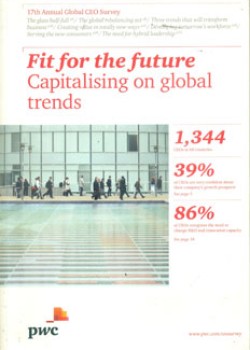
Fit For the Future
Capitalising on Global Trends
Publisher: Pricewaterhouse Coopers International (PwC)
Place of Publish: UK
Acc. No: 4469
Class No: 332.11 FIT
Category: Books & Reports
Subjects: Economics
Type of Resource: Monograph
Languages: English
In the report, over 1,300 business leaders worldwide reveal their degree of confidence in the global economy, their outlook on their company's growth prospects and their views on regulation, fiscal deficits, tax policies etc. They also share their insights into innovation, global trends and talent management. The survey findings highlight the majority believes that the global economy will improve in the next 12 months, compared to those polled last year. Nearly one third state their main opportunity for growth lies in existing markets, compared to just 14% who say the same for new geographic markets. Many leaders are also reviewing their portfolio of top overseas markets. CEOs think three big trends will transform their businesses over the coming five years. Technological advances such as the digital economy, social media, mobile devices and big data are also areas that will further expand. The working-age population is, as a result of demographic trends, undergoing major geographic shifts and urbanisation is causing further upheavals. The report also indicates that the most challenging issue CEOs face is finding and securing the workforce of tomorrow, particularly the skilled labour as technological advances make it both easier and harder to find skilled workers. CEOs also recognise the need to change strategies for attracting and retaining talent. Nearly two-thirds of CEOs believe the HR function is not well prepared for the changes needed to respond to transformative trends. The female labour force remains a largely untapped asset and also older workers will play a more active role in tomorrow's workforce, increasingly customers become enablers for the business.
This book also focuses on “The Need for Hybrid Leadership". CEOs recognise the need to plan for the short, mid and long term and to look at the whole footprint across social, environmental, fiscal and economic dimensions. In other words, CEOs must be hybrid leaders capable of looking into the near and far distance, combining the best of the old with the new and piloting their organisations through enormous changes to make the fit for the future.



